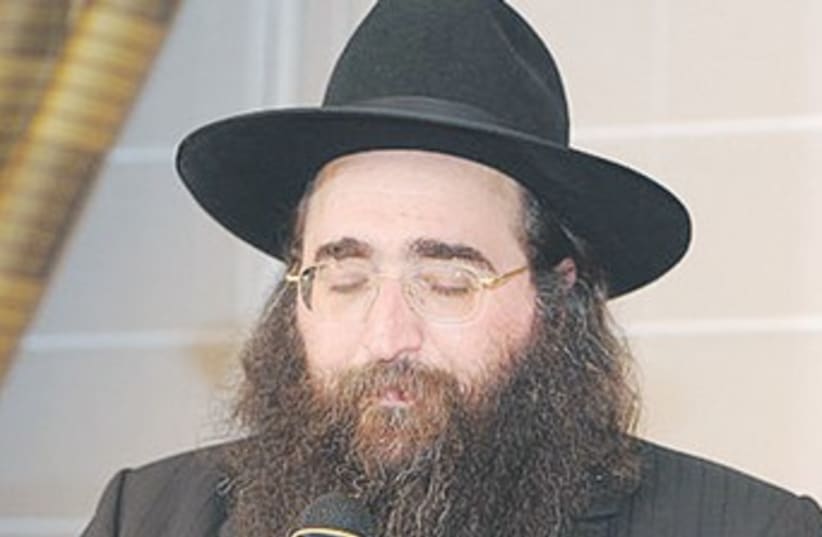The links between Rabbi Yoshiyahu Yosef Pinto and police Asst.-Ch. Menashe Arbiv, head of “the Israeli FBI,” were “an example of relations that were not prohibited by the law, but about which there were potential ethical issues,” State Comptroller Joseph Shapira said on Friday.Shapira, who made the remarks at a conference at Netanya Academic College, did not rule out a criminal indictment of Arbiv for accepting bribes, something that is still being considered. He was explaining, however, that the general closeness in relations between the two men was in itself ethically problematic.Arbiv, head of the Lahav 433 – National Crime Unit, was named on Thursday morning as the senior police official under investigation for suspected bribery in some way connected with the Ashdod and New York-based Pinto.
For more than a week before the announcement of his identity, the media was flooded with reports of a major scandal about to hit the police.Arbiv took a leave of absence on Wednesday, pending resolution of the issue. Police are expected to question him this week, as is the Knesset Interior Committee.On Saturday morning, Arbiv was filmed jogging through Yarkon Park in north Tel Aviv, saying he had “an excellent feeling” and he was “doing fine.”Pinto, founder of the Shuva Israel Yeshiva network, is under investigation for wrongdoing in the US by the FBI in one case, may be a victim of extortion in another US case involving Rep. Michael Grimm of New York and is under investigation for possible involvement in bribery cases in Israel.Regarding the case in Israel, the rabbi has reached a preliminary deal with the Justice Ministry, having provided information regarding the investigation of senior police officials. He may eventually arrive at a plea bargain, depending on how useful the information he provided turns out to be.At the conference on Friday, the state comptroller continued on the issue, saying, “A public servant, and certainly someone responsible for enforcing the law, is not a private person.”He also said, “I, as a judge, did not attend all sorts of events when I thought I did not need to be there.”Shapira said the Pinto-Arbiv relationship was not a legal issue, but “ethics do not deal with what is illegal and legal, rather they dictate what is fair and not fair, what is appropriate and what is not appropriate to do. The law is the floor for acceptable conduct, and ethics are the ceiling of acceptable conduct.”Nevertheless, he appeared to give an preliminary response rebuffing the Movement for Quality of Government in Israel that had said Arbiv should never have been approved to lead Lahav 443 when information was brought to Shapira’s attention about potential irregularities regarding Arbiv.Shapira said that regarding public appointments, the “comptroller does not need to get involved except in [the case of] an overwhelming administrative failure or legal violation.”The comptroller’s role was “to be a pillar of fire [a guide] for public norms,” he said.He appeared to deflect any criticism of his not investigating Arbiv’s appointment, by saying that he could only investigate allegations brought to him by the police, and that no such allegations came.Rather, “in the case of the appointment of Asst.-Ch. Arbiv there was general information of a reporter with no evidentiary support, which arrived the day before the appointment, such that even if I had performed my work at the fastest possible speed, I would not have arrived at any results until after the appointment.”“If the issue returns to my desk, I will check it,” Shapira said.In 2012, Pinto was arrested along with his wife after he allegedly gave a briefcase full of cash to Dep.-Ch. Ephraim Bracha, who reportedly, either was recorded during the meeting or told his superiors about Pinto’s attempted bribery, or both.Bracha now heads the police’s National Fraud Squad.Police said at the time that Pinto was trying to bribe Bracha to gain information about an investigation into a charity Pinto ran. Pinto denied the charge.Bracha was a follower of the rabbi in the past and, according to people close to Pinto, had previously received financial assistance from the rabbi.Reports have circulated that the information was linked to one of the FBI investigations, in which Pinto is a witness.The Justice Ministry reiterated on Thursday statement that it had cleared Bracha.Comptroller: Ties between senior police commander Arbiv, Pinto were unethical
Rabbi Yeshayahu Pinto is suspected of attempting to bribe a head of Lahav 422- National Crime Unit Menashe Arbiv; Knesset to hold hearings next week.
